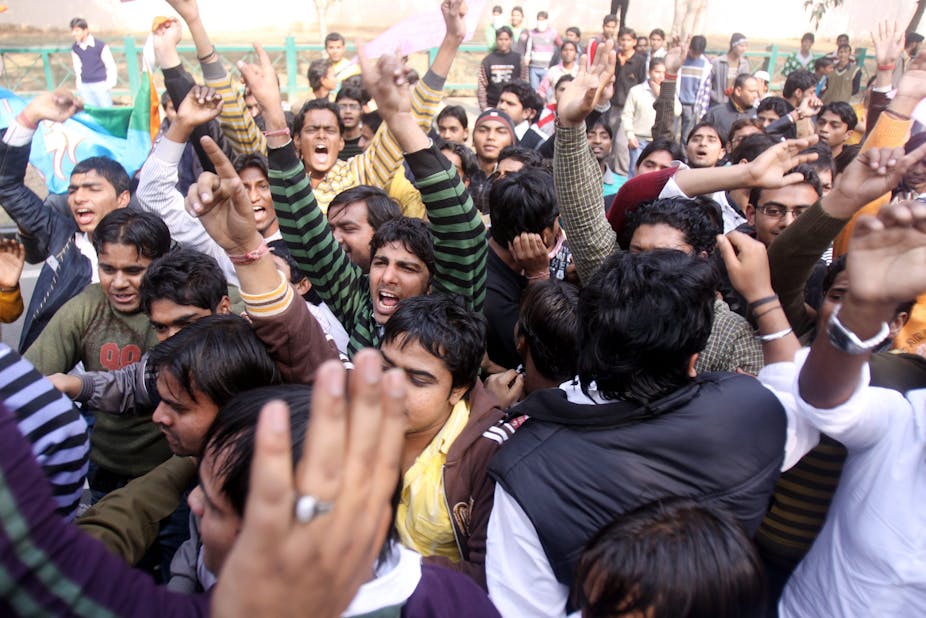Many Indians still perceive Australia as a white, monocultural country, according to the authors of a major report that says relations between the two countries are on the mend but remain brittle.
Despite a series of attacks on Indian students in 2009, Indians once again rank Australia as a top 10 country. But much more needs to be done to foster a relationship that years of neglect have left to wither, says Beyond The Lost Decade, a report by the Australia India Institute at the University of Melbourne.
The report calls for a rating system to downgrade states if they do not offer adequate security and education to international students, and says Australian school teachers should receive training in Hindi in anticipation of the addition of the language to the curriculum.
Additionally, it calls on Canberra to double the Department of Foreign Affairs and Trade’s public diplomacy budget to $10 million per year, and recommends - as a show of goodwill - extending the visas of Indian students caught up in changes to regulations following the crisis of 2009.
Enrolments by Indian students in Australian universities have fallen from a peak then of 120,000 to 37,453 in March this year.
One of the report authors, Ashok Malik, a prominent columnist for Indian newspapers and a Fellow of the Australia India Institute, said that “beyond the commonalities [of the two countries], frankly the relationship has lacked substance… it has been sub-optimal and has not achieved even a quarter of its potential.” For many Indians, exposure to Australian culture has come largely through contests on the cricket field, where the Australian team has long presented a monocultural face to the world, he said.
Amitabh Mattoo, appointed the first Director of the Australia India Institute last year, said that when he arrived in Melbourne he shared the impression that “Australia is not as multicultural as I found it. But it has been a most pleasant experience.
"Australia is not naturally multicultural. It’s about policy. It’s not organic. I think it’s great that in every aspect of public life there is a commitment to multiculturalism.”
Eventually, Professor Mattoo said, it would be “good to actually try and actually find out what happened in Melbourne [during the attacks on Indian students], and what was responsible for what was really an aberration, something which was a departure from the past and completely different from the way I see Melbourne today.
"If you drive from Melbourne University to Kew, you are traversing the geography of Asia, from little Saigon in Richmond, to Chinese in the CBD, to an Indian quarter. It’s fantastic.”
Report co-author Christopher Kremmer, a former foreign correspondent to India for the ABC and Fairfax newspapers, said: “In retrospect I think we could have called them the lost decades. The problem in the Australia-India relationship obviously has deep historical roots in the Cold War.
"It’d be fair to say that neither country was ready for a deeper relationship until 1991, when India started to open its economy, and the collapse of the Soviet Union and the whole game changed. What’s interesting about the relationship is that in the 20 years since India did start to open its economy, there has been a sense of spinning our wheels, not because diplomats haven’t been working hard, not because there hasn’t been political goodwill, but just because our attention has been elsewhere and some of the issues that have been important to the relationship have been very difficult issues - the uranium issue, the nuclear tests have challenged us.
"Ultimately it did come to a head in 2009, which was the big test, when the student crisis unfolded. And what surprised me about the student crisis was that it didn’t lead to a worse breach. In fact, it became a kind of opportunity to bury decades of benign neglect - cricket, democracy, the Commonwealth, an assumption that we knew each other.”
The authors of the report were unanimous in their criticism of Australian businesses for lacking the staying power needed to establish themselves in India. ANZ previously owned the Indian bank network Grindlays, but sold this to Standard Chartered in 2000. In the 1990s Telstra was among the first telecom companies to win mobile service licences in India in collaboration with a local business conglomerate. A few years later it chose to sell out and leave - today there are about 800 million mobile phone subscribers across the country.
John McCarthy, national president of the Australian Institute of International Affairs, said that “in all Asian countries, and particularly India, perseverance is the key … I see this as a fault generally with Australian business in Asia. It is a factor in the way we look at Asia that needs to be remedied.”

